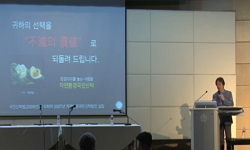플라톤 『변론』에서 소크라테스의 죽음관 연구는 철학적인 회의주의적 접근과 윤리적 낙관주의 해석에 편중되어 온 것이 사실이다. 이런 연구 풍토의 영향 하에 죽음에 대한 소크라테스의...
http://chineseinput.net/에서 pinyin(병음)방식으로 중국어를 변환할 수 있습니다.
변환된 중국어를 복사하여 사용하시면 됩니다.
- 中文 을 입력하시려면 zhongwen을 입력하시고 space를누르시면됩니다.
- 北京 을 입력하시려면 beijing을 입력하시고 space를 누르시면 됩니다.
https://www.riss.kr/link?id=A106155481
- 저자
- 발행기관
- 학술지명
- 권호사항
-
발행연도
2014
-
작성언어
Korean
-
주제어
소크라테스적 종교 개혁 ; 신탁 ; 인간적인 지혜 ; 제한된 불가지론 ; 큰 가망성 ; a Qualified Agnosticism ; Human Wisdom ; Much Hope ; Oracle ; Socratic Reformation
-
등재정보
KCI등재
-
자료형태
학술저널
- 발행기관 URL
-
수록면
185-208(24쪽)
-
KCI 피인용횟수
1
- 제공처
- 소장기관
-
0
상세조회 -
0
다운로드
부가정보
국문 초록 (Abstract)
플라톤 『변론』에서 소크라테스의 죽음관 연구는 철학적인 회의주의적 접근과 윤리적 낙관주의 해석에 편중되어 온 것이 사실이다. 이런 연구 풍토의 영향 하에 죽음에 대한 소크라테스의 철학적 입장에 경도된 전자는 그의 죽음관을 단적인 불가지론으로 정의해 왔다. 다른 한편으로 후자는 영혼의 운명에 대한 소크라테스적 낙관주의가 그의 윤리적 고결함에서 비롯됐음을 힘주어 강조하는 바람에 소크라테스가 성취한 그리스 전통 종교에 대한 근본적인 개혁을 제대로 평가하지 못하고 있다는 비판에 직면하고 만다. 소크라테스의 죽음관에 대한 이상의 이분법적 해석의 진영들을 소크라테스의 종교 논의로 확장하여 궁극적으로 그가 의도했던 죽음 논증의 진의에 좀 더 가까이 다가가려는 본 연구는, 『변론』 전반에서 그의 철학의 종교적 차원을 면밀하게 검토함으로써 기존 해석을 한층 고양하여 완결 짓는 데에 그 목적이 있다. 소크라테스 종교의 근본 신조는 신이 거짓말을 하지 않고 전선(全善)하며 박애적이라는 것이다. 이런 기본 원리들과 더불어서 소크라테스가 개진하는 죽음 좋음 논증의 희망 논의를 천착해보면, 소크라테스의 죽음관이 철학적인 회의주의적 제약과 신에 대한 인간의 올바른 태도인 종교적 헌신 간의 독특한 조합에서 도출되는 '제한된 불가지론'임을 명확하게 인식하게 된다. 아울러서 그의 죽음관과 관련하여 소크라테스적 종교 논의가 배제된 윤리적 낙관주의는 '제한된' 희망을 온전히 드러내지 못하는 반쪽 진리일 수밖에 없다는 사실도 함께 깨닫게 된다. 따라서 소크라테스의 죽음관에 관한 완벽한 이해는 죽음에 대해 모른다는 자각인 그의 인간적인 지혜, 죽음에 관한 그의 윤리적 낙관주의 그리고 죽음에 관한 그의 종교적 신념이 한 데 종합될 때에라야 비로소 그 본 모습에 도달할 수 있다고 하겠다. 그렇지만 죽음에 관한 그의 진술이 워낙 독특하게 유보적이고 조건적이기 때문에, 되레 우리는 그의 종교적인 희망 논의에서 그의 죽음관의 통합적 이해를 구하고자 하는 것이다. 소크라테스의 죽음관이 담고 있는 참된 의미는 바로 지금 여기에서 혼을 보살피고 돌보라는 촉구이다. 이런 의미에서 플라톤이 자기 스승의 삶과 죽음의 올바른 의미를 전하는 『변론』은 '소크라테스 철학으로의 초대'이다. 이 지점이 소크라테스가 공자와 조우하는 접점이기도 하다.
다국어 초록 (Multilingual Abstract)
It is safe to presume that the studies on the view of Socrates concerning death in Plato's Apology have been subjected to such approaches as the explanation of philosophical skepticism and the contribution of ethical optimism. Under the circumstances ...
It is safe to presume that the studies on the view of Socrates concerning death in Plato's Apology have been subjected to such approaches as the explanation of philosophical skepticism and the contribution of ethical optimism. Under the circumstances of these studies the former inclined to the philosophical attitude of Socrates has defined his view concerning death as an agnosticism. On the other hand the latter has highly emphasized that Socratic optimism on the destiny of the soul is derived from his ethical integrity and thereby has been exposed to the criticism of unbalanced evaluation about Socratic Reformation. Through the expansion from the above dichotomous interpretations to the bedrock of Socratic religion this study will examine closely the religious characteristics of his philosophy throughout Apology, elevate the 'received' views developed above, and investigate ultimately the true meaning of his death-argument suggested by Socrates. Socrates' gods are thoroughly good beings, and toward humanity they have an entirely benevolent and caring attitude. If we are going to take Socrates' hopes into account with this testimony and his argument for death's goodness, the view of Socrates concerning death is clearly revealed 'a qualified agnosticism' being the unique combination of his religious commitment and philosophical skepticism. Besides, it is worth while to recognize an half-truth as ethical optimism without the argument of Socratic religion. Therefore the comprehensive understanding about the view of Socrates concerning death seems to be composed of his epistemic pessimism concerning death, his ethical optimism relating to death, and his basic religious belief on death' good. However, his statements concerning death articulating that death is good but without providing a definitive account of what follows death is so reservedly conditional that we can get to be interested in his religious hopes as well. In any case, the true meaning in the view of Socrates concerning death may be concluded 'the improvement of our souls in the not-so-Elysian here and now.' In this sense Apology Plato informs the true meaning of the life and death of Socrates can properly be called as 'the invitation to Socratic philosophy', the care and tendance of the soul(psychē) by his divinely commissioned task. Hence, here can be the point of thoughtful contact of Socrates and Confucius.
참고문헌 (Reference)
1 孔子, "論語" 홍익출판사 2007
2 한병철, "피로사회" 문학과지성사 2013
3 플라톤, "플라톤의 네 대화편: 에우티프론, 소크라테스의 변론, 크리톤, 파이돈" 서광사 2003
4 플라톤, "크리톤" 이제이북스 2012
5 김귀룡, "철학, 죽음을 말하다" 산해 2005
6 정상봉, "철학, 죽음을 말하다" 산해 2005
7 케이건, 셸리, "죽음이란 무엇인가" 엘도라도 2013
8 박동환, "안티호모에렉투스" 도서출판 길 2001
9 김주일, "소크라테스는 ‘악법도 법이다’라고 말하지 않았다. 그럼 누가?" 프로네시스 2006
10 크세노폰, "소크라테스 회상" 범우사 1998
1 孔子, "論語" 홍익출판사 2007
2 한병철, "피로사회" 문학과지성사 2013
3 플라톤, "플라톤의 네 대화편: 에우티프론, 소크라테스의 변론, 크리톤, 파이돈" 서광사 2003
4 플라톤, "크리톤" 이제이북스 2012
5 김귀룡, "철학, 죽음을 말하다" 산해 2005
6 정상봉, "철학, 죽음을 말하다" 산해 2005
7 케이건, 셸리, "죽음이란 무엇인가" 엘도라도 2013
8 박동환, "안티호모에렉투스" 도서출판 길 2001
9 김주일, "소크라테스는 ‘악법도 법이다’라고 말하지 않았다. 그럼 누가?" 프로네시스 2006
10 크세노폰, "소크라테스 회상" 범우사 1998
11 조대호, "소크라테스 윤리의 그리스적 전통에 대한 연구: 소크라테스 철학 안에서 이성과 신적인 계시의 관계" 새한철학회 3 (3): 317-338, 2003
12 노직, 로버트, "무엇이 가치 있는 삶인가: 소크라테스의 마지막 질문" 김영사 2014
13 라에르티오스, 디오게네스, "그리스 철학자 열전" 동서문화사 2008
14 김인곤, "고르기아스" 이제이북스 2011
15 McPherran, Mark L, "The Religion of Socrates, Pennsylvania" The Pennsylvania State University Press 1996
16 Xenophon, Apology, "The Loeb Classical Library" Harvard University Press 1923
17 Kato, Shinro, "The Apology: The Beginning of Plato’s Own Philosophy" 41 : 1991
18 Vlastos, Gregory, "Socrates’Disavowal of knowledge" 35 : 1985
19 Vlastos, Gregory, "Socrates: Ironist and Moral Philosopher" Cambridge University Press 1991
20 Hecht, Jamey, "Plato’s Symposium: Eros and the Human Predicament" Twayne Publishers 1999
21 Burnet, John, "Plato’s Euthypro, Apology of Socrates, and Crito" Clarendon Press 1924
22 Strauss, Leo, "Leo Strauss on Plato’s Symposium" The University of Chicago Press 2001
23 Dover, K. J., "Greek Popular Morality in the time of Plato and Aristotle" Basil Blackwell 1974
24 Roochnik, D. L., "Apology 40c4-41e7 : Is Death Really a Gain?" 80 : 212-220, 1985
25 Guthrie, W.K.C, "A History of Greek Philosophy, vol. 3" Cambridge University Press 1969
동일학술지(권/호) 다른 논문
-
- 대한철학회
- 최소인(Choi So in)
- 2014
- KCI등재
-
한국무속사상에 있어서 인식범주와 존재양상에 관한 철학적 정초
- 대한철학회
- 하순애(Ha Soon ae)
- 2014
- KCI등재
-
- 대한철학회
- 김선욱(Kim Sean wook)
- 2014
- KCI등재
-
- 대한철학회
- 김성한(Kim Sung han)
- 2014
- KCI등재
분석정보
인용정보 인용지수 설명보기
학술지 이력
| 연월일 | 이력구분 | 이력상세 | 등재구분 |
|---|---|---|---|
| 2028 | 평가예정 | 재인증평가 신청대상 (재인증) | |
| 2022-01-01 | 평가 | 등재학술지 유지 (재인증) |  |
| 2019-01-01 | 평가 | 등재학술지 유지 (계속평가) |  |
| 2016-01-01 | 평가 | 등재학술지 선정 (계속평가) |  |
| 2015-12-01 | 평가 | 등재후보로 하락 (기타) |  |
| 2011-01-01 | 평가 | 등재학술지 유지 (등재유지) |  |
| 2009-01-01 | 평가 | 등재학술지 유지 (등재유지) |  |
| 2007-01-01 | 평가 | 등재학술지 유지 (등재유지) |  |
| 2004-01-01 | 평가 | 등재학술지 선정 (등재후보2차) |  |
| 2003-01-01 | 평가 | 등재후보 1차 PASS (등재후보1차) |  |
| 2001-07-01 | 평가 | 등재후보학술지 선정 (신규평가) |  |
학술지 인용정보
| 기준연도 | WOS-KCI 통합IF(2년) | KCIF(2년) | KCIF(3년) |
|---|---|---|---|
| 2016 | 0.39 | 0.39 | 0.39 |
| KCIF(4년) | KCIF(5년) | 중심성지수(3년) | 즉시성지수 |
| 0.38 | 0.35 | 0.984 | 0.2 |




 DBpia
DBpia







